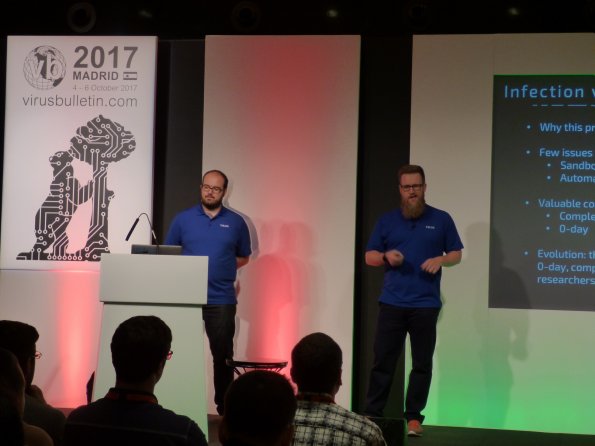Posted by Martijn Grooten on Dec 15, 2017
 Cerber is one of the major names in the world of ransomware, and last year, Check Point released a decryption service for the malware. Today, we publish a VB2017 paper by Check Point's Stanislav Skuratovich describing how the Cerber decryption tool worked; we have also uploaded the video of the presentation of this paper, by Or Eshed and Yaniv Balmas.
Cerber is one of the major names in the world of ransomware, and last year, Check Point released a decryption service for the malware. Today, we publish a VB2017 paper by Check Point's Stanislav Skuratovich describing how the Cerber decryption tool worked; we have also uploaded the video of the presentation of this paper, by Or Eshed and Yaniv Balmas.
Posted by Martijn Grooten on Dec 14, 2017
 Dutch security firm Fox-IT deserves praise for being open about an attack on its client network. There are some important lessons to be learned about DNS security from its post-mortem.
Dutch security firm Fox-IT deserves praise for being open about an attack on its client network. There are some important lessons to be learned about DNS security from its post-mortem.
Posted by Martijn Grooten on Dec 14, 2017
 For this week's Throwback Thursday, we look back at the video of a talk Level 3's Mike Benjamin gave at VB2016 in Denver, on BGP and BGP hijacks.
For this week's Throwback Thursday, we look back at the video of a talk Level 3's Mike Benjamin gave at VB2016 in Denver, on BGP and BGP hijacks.
Posted by Martijn Grooten on Dec 13, 2017
 Citizen Lab's Security Planner helps you improve your online safety, based on the specific threats you are facing.
Citizen Lab's Security Planner helps you improve your online safety, based on the specific threats you are facing.
Posted by Martijn Grooten on Dec 11, 2017
Today, we publish the video of the VB2017 presentation by Avast researcher Jakub Kroustek and his former colleague Előd Kironský, now at ESET, who told the story of Spora, one of of the most prominent ransomware families of 2017.
Read morePosted by Martijn Grooten on Dec 7, 2017
 During recent research, Cisco Talos researchers observed the ways in which APT actors are evolving and how a reconnaissance phase is included in the infection vector in order to protect valuable zero-day exploits or malware frameworks. At VB2017 in Madrid, two of those researchers, Paul Rascagneres and Warren Mercer, presented a paper detailing five case studies that demonstrate how the infection vector is evolving. Today we publish both Paul and Warren's paper and the recording of their presentation.
During recent research, Cisco Talos researchers observed the ways in which APT actors are evolving and how a reconnaissance phase is included in the infection vector in order to protect valuable zero-day exploits or malware frameworks. At VB2017 in Madrid, two of those researchers, Paul Rascagneres and Warren Mercer, presented a paper detailing five case studies that demonstrate how the infection vector is evolving. Today we publish both Paul and Warren's paper and the recording of their presentation.
Posted by Martijn Grooten on Dec 1, 2017
 At VB2017 in Madrid, CERT Poland researchers Maciej Kotowicz and Jarosław Jedynak presented a paper detailing their low-level analysis of five spam botnets. Today we publish their full paper.
At VB2017 in Madrid, CERT Poland researchers Maciej Kotowicz and Jarosław Jedynak presented a paper detailing their low-level analysis of five spam botnets. Today we publish their full paper.
Posted by Martijn Grooten on Nov 30, 2017
 We look back at the VB2016 presentation by Righard Zwienenberg (ESET) and Luis Corrons (Panda Security), in which they discussed various issues relating to anti-malware testing.
We look back at the VB2016 presentation by Righard Zwienenberg (ESET) and Luis Corrons (Panda Security), in which they discussed various issues relating to anti-malware testing.
Posted by Martijn Grooten on Nov 30, 2017
As an independent body in the IT security industry, Virus Bulletin is in an ideal position to act as a global source of information both about jobs currently available in the field and about those candidates currently seeking to start or progress their career in the industry - which is why we have relaunched the VB Security Jobs Market.
Read morePosted by Martijn Grooten on Nov 29, 2017
 At VB2017 in Madrid, macOS malware researcher Patrick Wardle presented the details of a specific piece of Mac malware, FruitFly, which he analysed through a custom C&C server - a technique that will also be of interest for researchers of malware on other platforms. Today we publish both Patrick's paper and the recording of his presentation.
At VB2017 in Madrid, macOS malware researcher Patrick Wardle presented the details of a specific piece of Mac malware, FruitFly, which he analysed through a custom C&C server - a technique that will also be of interest for researchers of malware on other platforms. Today we publish both Patrick's paper and the recording of his presentation.